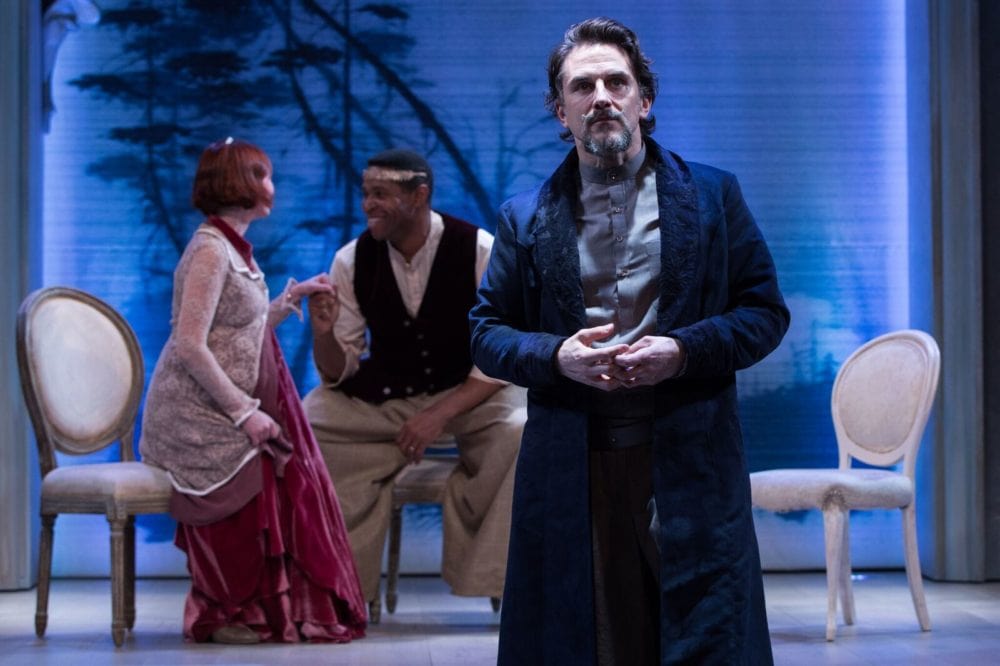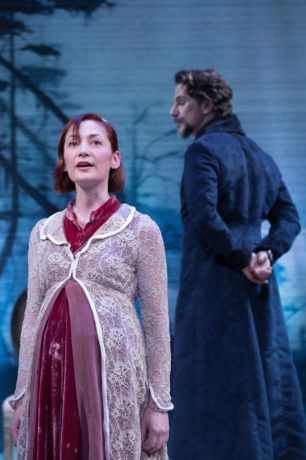One would not expect a tale full of heartbreak, betrayal, abandonment, and death to be a comedy. But that is exactly what Folger Theatre’s production of Shakespeare’s The Winter’s Tale is. Shakespeare’s plays were nothing if not complex, so it comes as no surprise that The Winter’s Tale transcends precise categorization. At heart, it is a romance, yet the story possesses an intense darkness made bearable only by the love, loyalty, and laughter it celebrates.

Michael Tisdale plays Leontes, King of Sicily, who has been hosting his boyhood friend and King of Bohemia, Polixenes (Aldo Billingslea). The men are like brothers and love each other dearly, but Leontes becomes jealous when his expecting wife, Hermione (Katie duBuys), persuades Polixenes to prolong his visit. Leontes’ rage comes on hard and fast, causing him to question the legitimacy of his young son, Mamillius (Daven Ralston), and unborn child.
Tisdale, as Leontes, imbues his performance with frightful mania. He is a man poisoned by imaginings that drive him toward the borders of insanity as the story unfolds.
Hermione becomes the target of his fury. duBuys performance highlight’s Hermione’s steadfast faith in the truth and belief that Leontes will repent once he realizes his error.
While imprisoned, Hermione gives birth to a baby girl. Paulina (Grace Gonglewski), a noblewoman dedicated to Hermione and ready to fight to restore her honor, believes that the sight of his daughter will soften Leontes and restore his mind to reason. But instead, Leontes commands Paulina’s husband, Antigonus (Eric Hissom), to take the infant to a remote place and leave it to the mercy of the elements.
Eric Hissom plays several roles and notably serves as the storyteller of the play, taking on much of the expository dialogue. Hissom changes his costume pieces on stage to become different characters, and always calls attention to the transitions, reminding the audience that he is our guide through the story. Many of the actors perform multiple roles, but only Hissom acknowledges the audience.

Paulina and Hermione are the most forceful characters of the show, defying the oft-referenced “weaknesses” of their sex. Gonglewski never waivers in her devotion to duBuys’ Hermione, and her determination to withstand the false accusations of her husband. Leontes is on a ruinous path and does not stop until he has destroyed all that he values most, but the innocence and righteousness of the women is never in question by anyone but Leontes.
Thus far, the story seems more like a tragedy, but Director Aaron Posner highlights every bit of humor, which weaves in and out of the scenes and softens the harshness of what transpires. And while the humor in the first act is subtle – mainly coming from the brief asides and quips by Gonglewski’s impassioned and forceful Paulina – the second act is blatant and boisterous.
Sixteen years have passed since Leontes’ daughter was cast off. At the end of the first act, Antigonus took her to Bohemia, named her Perdita, and left with her a fair amount of gold in hopes that she would be cared for. She’s found and raised by an Old Shepherd (Richard R. Henry) and his buffoon of a son (Joshua Thomas) who love and dote on her.
The visceral and internal torment of the first act has been replaced by joy, hope, and flat-out silliness. The two parts of The Winter’s Tale can feel as if they are separate stories, but Posner has created a world in which extremes can coexist.
Music Director Liz Filios composed original music for the show, which adds to the production’s beautiful aura of majesty. The set, designed by Luciana Stecconi, is fittingly painted with hues of blue and white, giving off the impression that the stage was made of snow and ice.
The Winter’s Tale is a roller coaster in all senses of the term: Highs and lows, joy and sorrow, and anger and regret. Folger Theatre presents the play as a magical tale, using the nature of storytelling to allow the audience to accept and welcome the absurdities and extremes of the play.
This is a production that can be enjoyed by Shakespeare lovers as well as those unfamiliar with the work. And the decision to pluck every morsel of comedy from the text ensures that love and joy are at the heart of the production, filling the audience with the warmth of hope and laughter, despite the winter they have just journeyed through.
Running Time: Approximately two hours and 30 minutes, including one 15-minute intermission.
The Winter’s Tale plays through April 22, 2018, at Folger Theatre – 201 East Capitol Street, SE, in Washington, DC. For tickets, call the box office at (202) 544-7077, or purchase them online.




